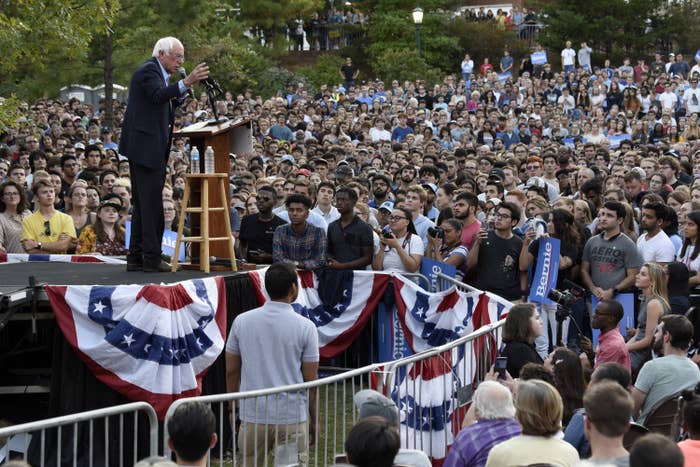
GREENSBORO, N.C. — In the chapel of historically black Bennett College, where Martin Luther King Jr. once spoke at the height of the civil rights movement, a student asked Bernie Sanders on Friday afternoon how he’s going to help struggling schools like this one.
“Do you have a plan for funding HBCUs?” Marshele Parker asked the senator. “Because right across the street we have North Carolina A&T that I now attend, but I once did attend Bennett College, and the disparities between the two is very real.”
The town hall was part of a recent Sanders campaign back-to-school swing, which also included events at Winthrop University in South Carolina and the University of North Carolina in Chapel Hill. Bennett has struggled to stay open because of faltering funding, even briefly losing its accreditation earlier this year.
“We do have a plan, and the plan is to make all public colleges and universities and all HBCUs tuition free,” Sanders said, to applause. “To significantly increase Pell grants, to significantly increase work study programs with the results that nobody regardless of your income who goes to college will come out to debt and to cancel all student debt in America.”
That didn’t entirely answer the question.
"I feel like he didn’t answer my question which kind of sucks," Parker, 19, told BuzzFeed News later. "It kind of sways my voting opinion because I know that there are candidates who have plans for HBCUs outside of just making the tuition-free. Even if the tuition is free there’s still other obstacles at these schools."
She mentioned Sens. Kamala Harris and Elizabeth Warren as candidates who have specific plans or have talked more substantially about funding HBCUs.
But for many young black voters in the crowded church, Sanders’ response — even just his presence at a smaller, embattled HBCU — was evidence he is in tune with how they’re thinking about racial justice issues. Before Friday, the college hadn’t had a visit from a presidential candidate since Rep. Shirley Chisholm came to the school in 1972.
“I feel like he’s learning so much that he didn’t know previously. I’ve watched a lot of Bernie Sanders videos, and just the knowledge that he’s accumulated from last time he was running to this time, it’s just so different,” said Jada Bethea, 20, a UNC Greensboro student at the Bennett rally, who mentioned campaign co-chair Nina Turner, a former Ohio state senator who is black, and also on the tour with Sanders.
“I just hope black people and other people of color are paying attention to that,” Bethea added, “that he’s learning and he still knows he has a lot to learn and he’s just open minded.”
Bethea’s friend, Kylah Burnette, 19, also a student at UNC Greensboro, agreed. “[Sanders] has said over and over that there’s a lot of things that have been happening in the black community that he didn’t know about,” she said. “He’s one of the few that’s been open to educating himself on that.” She added that she thought Sanders handled Black Lives Matter protesters in 2016 more respectfully than his opponent, Hillary Clinton.
How Sanders engaged with issues of race, and voters of color, has been central to understanding Democratic politics over the last five years. In 2016, the support of black voters in the South gave Clinton a tremendous advantage in the nominating process. Some black activists critiqued what they saw as Sanders emphasizing economic issues without talking in a meaningful way about racism.
This time around — even as Sanders faces a much more complicated field that includes Elizabeth Warren, who shares similar if not identical policy priorities — his popularity with younger voters endures. And, for as much as his previous campaign struggled to attract widespread support from black voters in 2016, Sanders’ favorability remains with a real contingency of younger voters of color. Nonwhite younger voters aren't often polled specifically, but the generational divides this year are real.
At three different college events on Sanders’ tour through the Carolinas this week, black students said they think he’s getting better at talking about racial justice issues. They said they see Sanders as an advocate for racial justice through the issues that are most pressing for them — college debt, climate change, health care, and drug-sentencing changes.
Many said they were still open to hearing from other candidates, and only around one third of those who spoke to BuzzFeed News said they were sure they would vote for Sanders.
“College debt and that being completely erased, I think that's a huge thing,” said Sydni Walker, 19, a student at UNC Chapel Hill. “That would give us a really good start, almost like a form of reparation, that would be really great because that would allow us to establish some kind of generational wealth.”
“I believe he does a great job talking about [racial justice], especially getting more attention on HBCUs,” said Karmen Goode, 19, another student at UNC Greensboro. “Bennett College has a bankruptcy problem and I think he has a great focus on HBCUs and getting more funding to them. We need more attention for funding for HBCUs, it’s not fair that PWIs [predominantly white colleges] get more funding.”
Former Ohio state senator Nina Turner, one of Sanders’ campaign co-chairs, told BuzzFeed News she thinks the perception that he’s doing better at talking about racial justice this time around comes partly from voters learning more about Sanders’ civil rights credentials and personal history as the son of an immigrant and Holocaust survivor.
“To me the difference between this time and last time is that the senator got into the race sooner,” she said. “People got a chance to know him. In 2016, it was about the man, and now it's about why the vision drives the man.”
“Everybody has room to grow. Everybody. Every candidate that’s running. Every human being has room to grow,” she added.
Sanders’ repeated callbacks to his involvement with the civil rights movement in the ‘60s as evidence of his commitment to racial justice has occasionally frustrated some voters and activists looking for something more current. One student at the UNC Chapel Hill rally on Thursday was less enthusiastic about Sanders repeatedly bringing up his involvement in the march on the campaign trail.
“I think he's trying but sometimes him referring back to the marches is almost like him backpedalling, it's like he's saying, ‘I did a lot for you that time’, but there's still so much left to do,” said Walker, the student at UNC Chapel Hill, adding that she would “really love to see Bernie as the president” but is also open to other candidates.
But several black students this week brought up his involvement in the March on Washington as one reason they’re comfortable with his record on racial justice.
“He was at the civil rights movement, that’s one thing that I like about him, because he understands personally about the struggles that we’ve faced in the African-American community,” said Naiyara Vann, 20, a student at Bennett College who said she plans to vote for Sanders.
For people in their teens and 20s, the decades-old pasts of the two oldest candidates, Sanders and Biden, can seem like a real contrast. Biden, elected to the Senate in 1972, notably opposed mandatory busing to integrate schools in the 1970s and early 1980s, something his rivals for the nomination have brought up on the debate stage. Bethea said she considers Biden “a Trump Democrat” and would struggle to vote for him if he’s the Democratic nominee. Others said they would vote for him if he was the only alternative to Trump but they would rather support Sanders or someone else.
“He thinks he doesn’t have a part in segregation but the fact that you weren’t fighting against it, you are a part of it. Your silence was a part of it. You not going out and doing something,” Bethea said of Biden. “You were a politician, you had the power to change something and nothing changed because of you, things changed because of black people, because of other people of color, because of white people fighting with us and you were not one of them, so you are not fighting for us.”
Oriana Gilmore, 21, a student at Winthrop University in Rock Hill, said she thinks Sanders might be talking more explicitly about racial justice this time around because of a shift in the national conversation on racism since 2016.
“One difference I can think of between 2016 and now is that I think maybe he could have been a little hesitant to talk about it because I feel like people call out racism more in 2019 than they did in 2016,” she said, adding that she hasn’t made up her mind, but Sanders is a strong contender for her vote.
“I think he’s definitely a lot more vocal about it, and especially knowing his background, I know he was active during the civil rights era and has been active since then,” she said.
Still, for the campaign, the question of whether Sanders can appeal to older black voters looms large — particularly at a time when older Democratic voters, both black and white, favor the more moderate Biden, setting up potentially sharp generational divides within the Democratic electorate.
“The message (Sanders) is preaching to the young is the same message for the seasoned voters, that your quality of life deserves better than what you have been getting in your lifetime,” Turner said.
Phillip Agnew, an activist and Sanders surrogate, said he believes the path to broader support is through students’ persuasion. “Thanksgiving and Christmas. When those grandparents have to sit at the dinner table with their grandchildren, that’s the most important thing.”
“What this campaign is concerned about is telling a compelling story about the vision of this country and letting the people, one million people now have donated to this campaign, go home and talk to their grandparents,” he said.
UPDATE
This article has been updated with further comment from a student at Sanders' Greensboro event.

